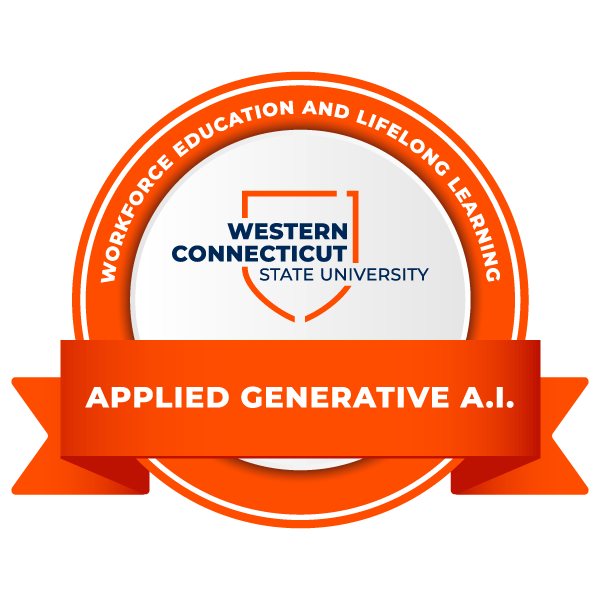Search WCSU
WCSU Essentials
Automatic translation disclaimer
Translation of this page is provided by the third-party Google Translate service. In case of dispute, the original language content should prevail.
La traducción de esta página la proporciona el servicio Google Translate de terceros. En caso de disputa, prevalecerá el contenido del idioma original.
La traduction de cette page est fournie par le service tiers Google Translate. En cas de litige, le contenu de la langue originale prévaudra.
Applied Generative AI Certificate
Next offering dates: 10/6/25 - 12/3/25
SCHOOL OF Graduate, International and Career Studies
Enhance your AI Skills for Today's Digital Landscape
Program Overview
The Applied Generative AI Certificate is an 8-week hybrid program. It’s built for adult learners, career changers, and working professionals. You’ll use real generative AI tools to create text, images, and more. No coding required. You’ll learn prompt engineering, model selection, and AI ethics. Each skill applies to real tasks in writing, design, business, or education. The program ends with a capstone project you design for your own field.
Certificate Objectives
- Learn what generative AI is, how it works, and how it differs from predictive AI. Focus on LLMs, transformers, and embeddings in text, image, and audio. (M1)
- Use real AI tools to explore applications in business, education, and healthcare. No setup needed. (M1)
- Build clear, focused prompts using proven structures—context, instructions, and constraints. (M2)
- Create and refine prompts for writing, summarizing, answering questions, and generating images. (M2)
- Understand how AI makes images. Use diffusion models and GANs with structured prompts. Handle copyright and authenticity. (M3)
- Write blogs, emails, and product content with GenAI tools. Fix tone issues and reduce hallucinations. (M4)
- Design clean slides and infographics using AI tools—even if you’re not a designer. (M5)
- Use GenAI to make quizzes, study guides, and lessons. Keep content inclusive and bias-aware. (M6)
- Automate tasks like reports, summaries, and responses with AI. Use vector search safely. (M7)
- Spot and manage LLM issues—hallucinations, context loss, overconfidence, and language problems. (M7)
- Apply AI responsibly. Protect privacy and follow ethical practices. (M7)
- Build a no-code AI project for your job. Show your skills in prompt design, tool use, and ethical AI. (M8)

Time Commitment:
Flexible scheduling with evening in-person sessions and online learning modules.

Dr. Shahab S. Band
Instructor
email: bands@wcsu.edu
Certificate Modules
| Module | Week of | Title | Key Topics |
|---|---|---|---|
| 1 | 10/06/25 | Predictive AI, LLMs, diffusion models, practical tools | GenAI vs. Predictive AI, LLMs, diffusion models, practical tools |
| 2 | 10/13/25 | Prompt Engineering Basics | Prompt structure, task-specific prompts, refinement techniques |
| 3 | 10/20/25 | Image Generation with AI | Diffusion models, GANs, image prompt design, ethics & copyright |
| 4 | 10/27/25 | AI for Writing & Content Creation | Writing prompts, tone control, hallucination mitigation |
| 5 | 11/03/25 | Presentation & Design Support | AI-generated slides, infographics, layout tools |
| 6 | 11/10/25 | AI in Education & Learning | Educational content generation, inclusivity, ethical challenges |
| 7 | 11/17/25 | Generative AI in Business & Productivity | Business reporting, data summarization, secure usage |
| 8 | 12/01/25 | Future Trends & Capstone Project | Advanced features, deep search, learner-led GenAI project |
Detailed Outline
M1: Introduction to Generative AI
- What is Generative AI
- Compare GenAI vs. predictive AI;
- explore examples
- Understanding LLMs, Transformers, Embeddings
- Hands-on with ChatGPT, Claude, DALL·E; explore how these models work
- Generative AI Across Domains
- Test GenAI for text, image, audio, and video tasks
M2: Prompt Engineering Basics
- Prompt Engineering Principles
- Learn clarity, context, instruction, and constraints
- Prompt Design for Common Tasks
- Write prompts for summaries, stories, Q&A, content generation
- Iterative Prompt Refinement
- Revise prompts, evaluate outputs, and compare results
M3: Image Generation with AI
- How AI Generates Images
- Intro to diffusion models and GANs
- Prompting for Style and Composition
- Craft prompts to generate specific visual styles
- Ethics of AI-Generated Images
- Discuss copyright, deepfakes, and authenticity concerns
M4: AI for Writing & Content Creation
- Writing with AI
- Generate blogs, posts, emails, and descriptions
- Tone, Style, and Format
- Prompt for consistency and clarity across content types
- Fixing AI Output Errors
- Identify and mitigate hallucinations and tone mismatches
M5: Presentation & Design Support
- Designing with AI Tools
- Create slide decks, posters, and infographics
- Prompting for Visual Layout
- Generate clean and engaging designs
- Accessible Tools for Non-Designers
- Explore Canva, Visme, Tome, etc.
M6: AI in Education & Learning
- AI for Lesson and Quiz Creation
- Design educational materials using AI
- Tutoring and Personalized Learning
- Generate flashcards, study plans, and micro-lessons
- Bias and Inclusion in AI Content
- Evaluate and adjust outputs for fairness
M7: Generative AI in Business & Productivity
- Automating Reports and Docs
- Use GenAI for summarization and reporting
- Customer Support and Communication
- Generate emails, FAQs, and chatbot-style content
- Search and Data Retrieval
- Apply vector search; secure prompt design
M8: Future Trends & Capstone Project
- Advanced AI Capabilities
- Explore deep search, iterative reasoning
- Capstone Project Design
- Plan and prototype a domain-specific GenAI tool
- Project Presentations and Feedback
- Share work, get peer and instructor feedback
Certificate Learning Outcomes
Upon successful completion of the Applied Generative AI Certificate, learners will be able to:
- Defining and describing core concepts in generative AI, including large language models (LLMs), transformers, and embedding across text, image, audio, and video domains.
- Compare generative and predictive AI approaches, identifying appropriate use cases across business, education, and healthcare settings.
- Design and refine effective prompts for multiple output types, including content generation, summarization, image creation, and question-answering tasks.
- Evaluate generative AI outputs for quality, tone, accuracy, and alignment with user intent, applying iterative prompt engineering techniques.
- Identify and mitigate common limitations in generative AI models, such as hallucinations, context loss, overconfidence, and multilingual challenges.
- Apply ethical principles and responsible AI practices related to bias, data privacy, and secure use of AI tools in professional settings.
- Utilize accessible AI platforms to support real-world tasks such as writing, visual design, business automation, and personalized learning.
- Plan, develop, and present a no-code generative AI solution that addresses a domain-specific problem and demonstrates practical understanding of model selection, prompt engineering, and ethical considerations.
- Engage in peer collaboration, feedback exchange, and reflection to improve the design and implementation of AI-driven solutions.
- Identify trends, tools, and skills necessary to continue learning and adapting in the evolving landscape of generative AI.
Assessment Plan
The following assessment instruments will be used to evaluate the participants’ learning outcomes and overall understanding of the Applied Generative AI concepts.
- Weekly Tasks: Prompt creation, content generation, analysis, and ethical evaluations.
- Capstone Project: Final project demonstrating tool use, prompt mastery, and ethical AI application.
Copyright & Originality Statement


